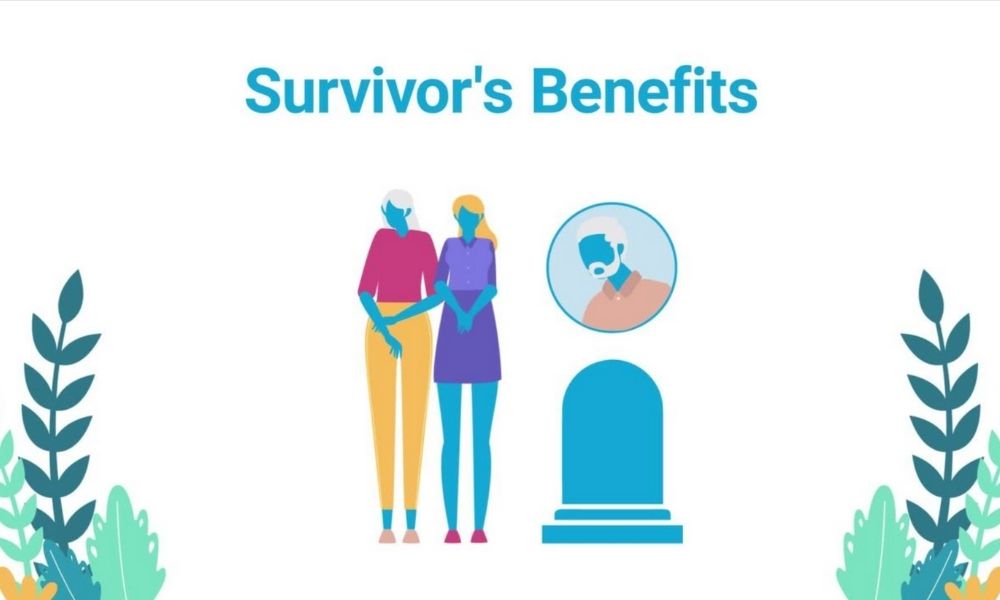Losing a spouse is a difficult and emotional experience, and the last thing on a person’s mind during this time is financial matters. However, it is important to understand the benefits that may be available to a surviving spouse, especially if the deceased spouse was the primary breadwinner. One such benefit is survivors benefits, which are provided by the Social Security Administration (SSA) to help support the surviving spouse and any dependent children. In this article, we will explore how long a spouse can receive survivors benefits and the factors that may affect the duration of these benefits.
Contents
Understanding Survivors Benefits
Survivors benefits are a type of Social Security benefit that is paid to the surviving spouse and dependent children of a deceased worker. These benefits are intended to provide financial support to the family of the deceased, as they have lost a source of income. Survivors benefits are different from other types of Social Security benefits, such as retirement benefits, as they are not based on the deceased worker’s earnings record. Instead, they are based on the deceased worker’s Social Security contributions and the age of the surviving spouse.
It is important to note that survivors benefits are not automatically given to the surviving spouse. The surviving spouse must apply for these benefits and meet certain eligibility requirements. These requirements include being at least 60 years old (or 50 if disabled), being married to the deceased worker for at least 9 months, and not being remarried before the age of 60 (or 50 if disabled). If the surviving spouse is caring for a child under the age of 16, they may be eligible for benefits regardless of their age or marital status.
Read:What is chapter 33 va benefits?Duration of Survivors Benefits
The duration of survivors benefits depends on several factors, including the age of the surviving spouse, the number of dependent children, and the deceased worker’s Social Security contributions. In general, a surviving spouse can receive survivors benefits for the rest of their life, as long as they meet the eligibility requirements. However, there are certain circumstances that may affect the duration of these benefits.
Age of the Surviving Spouse
The age of the surviving spouse is a significant factor in determining the duration of survivors benefits. If the surviving spouse is at least 60 years old (or 50 if disabled), they can receive survivors benefits for the rest of their life. However, if the surviving spouse remarries before the age of 60 (or 50 if disabled), they will no longer be eligible for survivors benefits. This is because the SSA considers the remarriage as a change in circumstances that may affect the need for these benefits.
If the surviving spouse is caring for a child under the age of 16, they can receive survivors benefits regardless of their age or marital status. However, once the child turns 16, the surviving spouse’s eligibility for benefits will be reevaluated. If the surviving spouse is still under the age of 60 (or 50 if disabled) at this time, they will continue to receive benefits until they reach the age of 60 (or 50 if disabled).
Read:How to apply snap benefits new jersey?Number of Dependent Children
The number of dependent children can also affect the duration of survivors benefits. If the surviving spouse has dependent children under the age of 16, they can receive benefits until the youngest child turns 16. However, if the surviving spouse has a disabled child, they can continue to receive benefits for as long as the child remains disabled. In some cases, the surviving spouse may also be eligible for additional benefits if they have multiple dependent children.
Social Security Contributions of the Deceased Worker
The amount of survivors benefits that a surviving spouse can receive is also dependent on the Social Security contributions of the deceased worker. The more the deceased worker has contributed to Social Security, the higher the survivors benefits will be. This is because the amount of survivors benefits is based on a percentage of the deceased worker’s Social Security retirement benefit. If the deceased worker had a higher income and contributed more to Social Security, their survivors benefits will be higher as well.
Factors That May Affect the Duration of Survivors Benefits
While the above factors determine the general duration of survivors benefits, there are certain circumstances that may affect the continuation of these benefits. These include the remarriage of the surviving spouse, the death of the surviving spouse, and changes in the eligibility of dependent children.
Read:what is cost benefit analysisRemarriage of the Surviving Spouse
If the surviving spouse remarries before the age of 60 (or 50 if disabled), they will no longer be eligible for survivors benefits. This is because the SSA considers the remarriage as a change in circumstances that may affect the need for these benefits. However, if the surviving spouse remarries after the age of 60 (or 50 if disabled), they can continue to receive survivors benefits.
Death of the Surviving Spouse
If the surviving spouse passes away, their survivors benefits will end. However, if the surviving spouse has dependent children, these children may be eligible for survivors benefits until they turn 18 (or 19 if still in high school). In some cases, the surviving spouse may also have designated a secondary beneficiary to receive any remaining survivors benefits after their death.
Changes in the Eligibility of Dependent Children
If the surviving spouse has dependent children, their eligibility for survivors benefits may change as the children grow older. For example, if a child turns 16, the surviving spouse’s eligibility for benefits will be reevaluated. If the child is no longer considered a dependent, the surviving spouse may no longer be eligible for benefits. Additionally, if a child turns 18 (or 19 if still in high school), their eligibility for benefits will also end.
Examples of Survivors Benefits Duration
Let’s look at a few examples to better understand the duration of survivors benefits.
Example 1: Surviving Spouse Receiving Benefits Until Age 60
John and Mary were married for 15 years before John passed away at the age of 55. Mary is 50 years old and has no dependent children. She is eligible for survivors benefits and starts receiving them immediately. However, when Mary turns 60, her eligibility for survivors benefits will be reevaluated. If she is still unmarried at this time, she can continue to receive benefits for the rest of her life.
Example 2: Surviving Spouse Receiving Benefits Until Remarriage
Tom and Sarah were married for 25 years before Tom passed away at the age of 65. Sarah is 62 years old and has no dependent children. She is eligible for survivors benefits and starts receiving them immediately. However, when Sarah turns 63, she decides to remarry. As a result, her eligibility for survivors benefits will end.
Example 3: Surviving Spouse Receiving Benefits Until Child Turns 16
Mark and Lisa were married for 10 years before Mark passed away at the age of 40. Lisa is 38 years old and has a 10-year-old child. She is eligible for survivors benefits and starts receiving them immediately. However, when the child turns 16, Lisa’s eligibility for benefits will be reevaluated. If she is still under the age of 60 at this time, she can continue to receive benefits until she turns 60.
Statistics on Survivors Benefits
According to the SSA, in 2020, there were approximately 5 million widows and widowers receiving survivors benefits. This accounted for about 7% of all Social Security beneficiaries. The average monthly survivors benefit was $1,453 for a widow or widower and $2,546 for a widow or widower with children. These benefits provided crucial financial support to families who have lost a loved one.
Conclusion:
Losing a spouse is a difficult and emotional experience, and the last thing on a person’s mind during this time is financial matters. However, it is important to understand the benefits that may be available to a surviving spouse, such as survivors benefits. The duration of these benefits depends on several factors, including the age of the surviving spouse, the number of dependent children, and the deceased worker’s Social Security contributions. While these benefits can provide crucial financial support, it is important to keep in mind that certain circumstances, such as remarriage, may affect the continuation of these benefits. It is recommended to consult with a financial advisor or the SSA for more information on survivors benefits and how they may apply to your specific situation.









